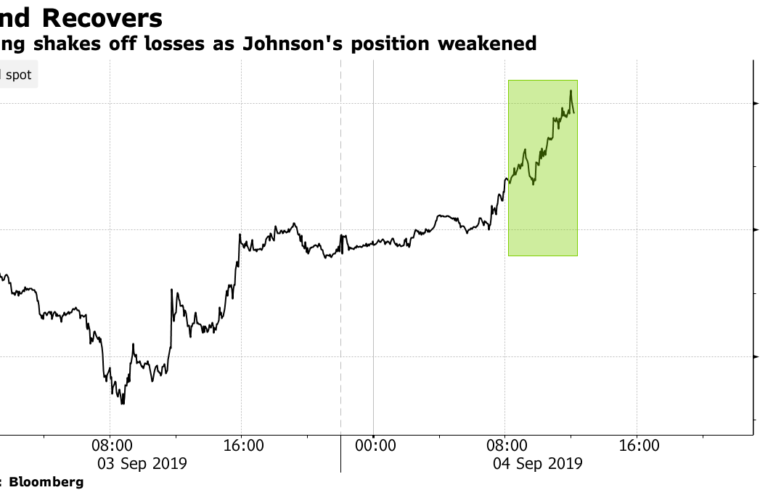Want the lowdown on European markets? In your inbox before the open, every day. Sign up here.
The pound rallied 1% and gilts slid as investors saw a lower risk of a no-deal Brexit following a defeat for the government in Parliament.
Sterling led gains among Group-of-10 peers and U.K. stocks also gained as lawmakers were expected to vote Wednesday to force Prime Minister Boris Johnson to delay Brexit by three months. Johnson retaliated by calling for a general election, though he will need two-thirds of the House of Commons to vote for it and he has already lost his parliamentary majority.

“Sterling has managed to recover some ground against the euro and the dollar as investors price in less probabilities of a hard Brexit, or just take some profits on their pound shorts,” said Valentin Marinov, head of Group-of-10 currency strategy at Credit Agricole SA. “Johnson’s plan of taking the U.K. out of the EU with or without deal on Oct. 31 becomes quite unlikely.”
The U.K. currency has fallen since Johnson took power but clawed back some of the move this week after lawmakers took the first step Tuesday toward forcing another Brexit extension. The opposition Labour party said it will not support Johnson’s call for an election until the Brexit delay is enshrined in law.
The pound jumped as much as 1.2% to $1.2220, in its second day of gains, and strengthened 0.7% to 90.22 pence per euro. The yield on U.K. 10-year government bonds gained 10 basis points to 0.50%. The FTSE 100 rose 0.4%, with domestic-oriented shares such as retailers advancing.
Even data signaling that the U.K. could be on course for its
first recession since the financial crisis didn’t dim the rally, after the services industry became the latest leading indicator to miss estimates.
Traders still have to contend with a spending statement from Chancellor Sajid Javid later Wednesday. Then, Bank of England Governor Mark Carney will testify in front of the Treasury Select committee, followed by lawmakers putting forward a draft law in Parliament that would force Johnson to delay Brexit until Jan. 31.
The pound could see further gains should the extension pass and attempts to stall that through an early election fail, said Jeremy Stretch, head of Group-of-10 currency strategy at Canadian Imperial Bank of Commerce. “There is scope for shorts to squeeze in the process, taking out the pound slide from late July.”
Investors are still expecting more political turmoil and are buying volatility to insure against price swings into the end of January 2020, which would become the next Brexit deadline, meaning this looks like “a temporary reprieve for the pound more than anything else,” said Credit Agricole’s Marinov.
With Johnson losing his parliamentary majority, an election looms even if lawmakers vote against holding one later Wednesday. Investors could then face the risk of a Parliament more in favor of no-deal or a less business-friendly Labour government led by Jeremy Corbyn.
“This is the problem now with the U.K., you’ve got no-deal on the left, Corbyn on the right, what is your positive scenario?” said Jordan Rochester, a strategist at Nomura International Plc, in an interview with Bloomberg Television.
— With assistance by Blaise Robinson, and Ksenia Galouchko











